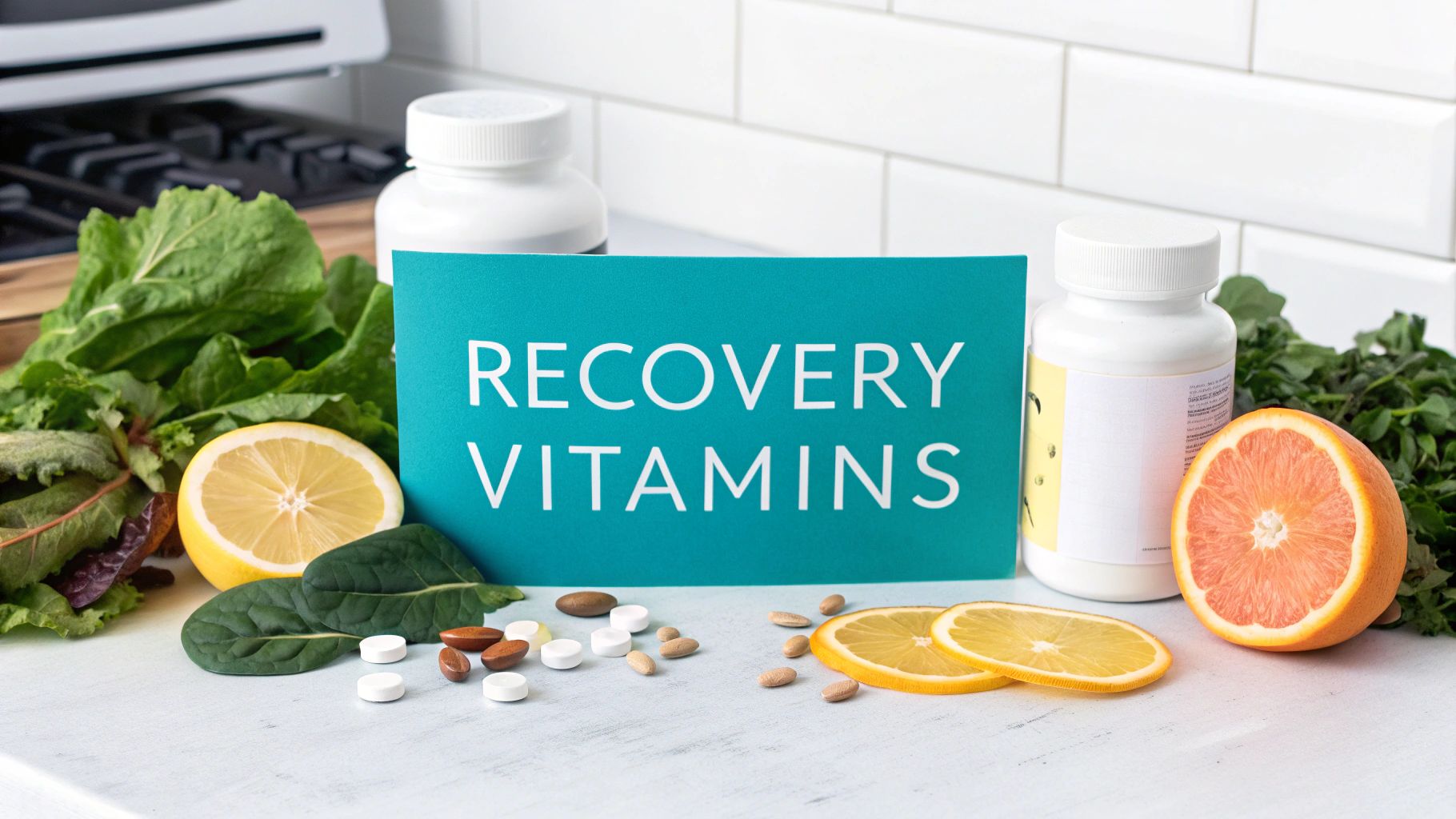

· By Annemarie
Best Vitamins for Heavy Drinkers to Aid Recovery
If you're a heavy drinker, the best vitamins are the ones that focus on refilling the tank that alcohol so aggressively drains. We're talking primarily about the B-complex vitamins (especially Thiamine B1), fat-soluble players like vitamins A, D, and E, and critical minerals such as magnesium and zinc. These nutrients are the front-line soldiers supporting your liver, brain, and cellular repair against alcohol's constant assault.
How Alcohol Siphons Nutrients From Your Body
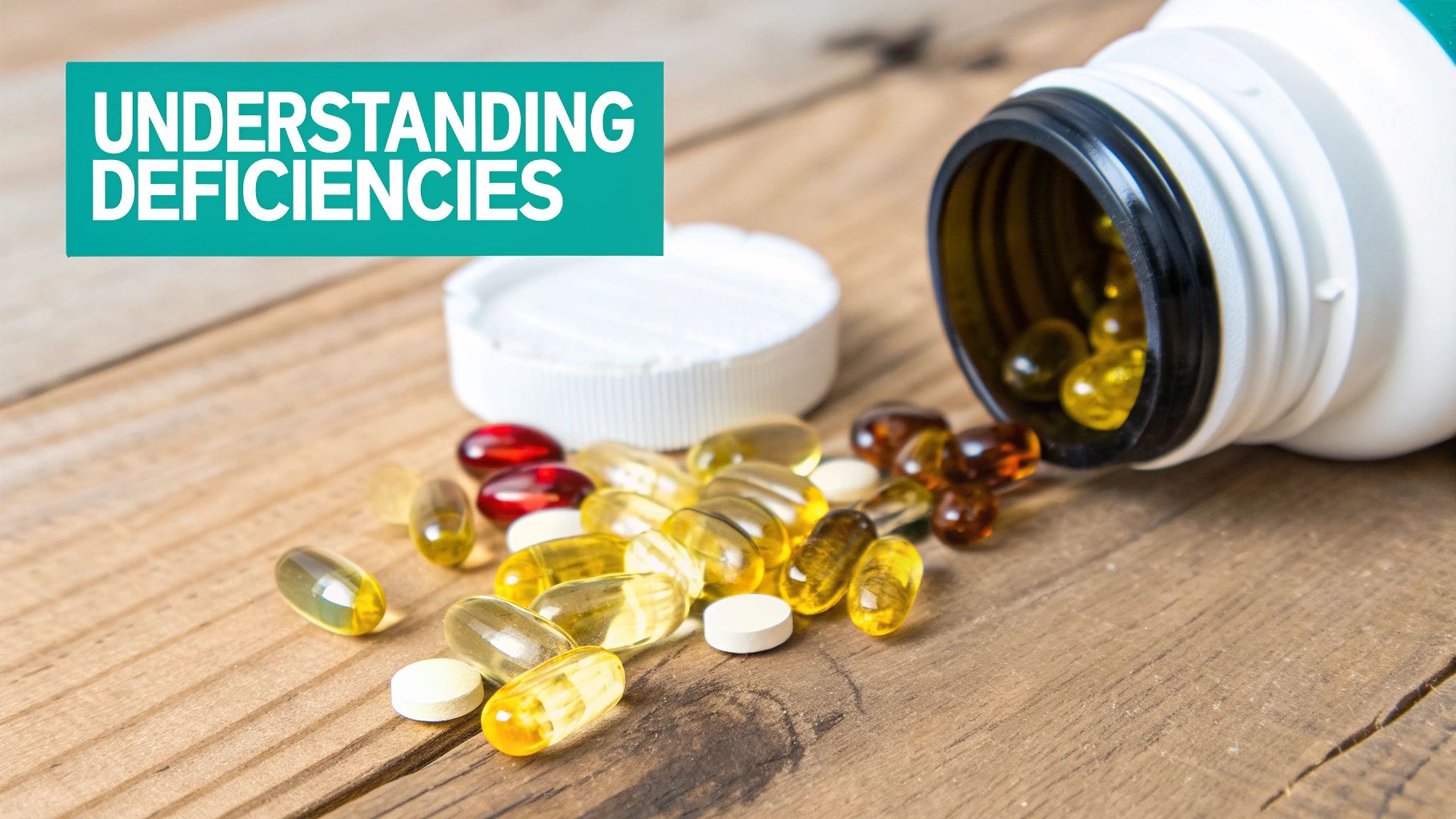
Think of your body as a high-performance engine. Heavy alcohol consumption is like forcing it to run on dirty fuel, making it burn through its vital fluids (nutrients) at an alarming rate. At the same time, it’s actively damaging the fuel lines—your digestive system.
This kicks off a vicious cycle of depletion that can be incredibly tough to escape. Alcohol isn't just a source of empty calories; it actively sabotages your body's ability to stay nutritionally balanced. Getting a handle on this is the first real step toward fighting back.
The Double-Edged Sword of Depletion
Alcohol’s attack on your nutrient reserves is a two-pronged assault. First, it directly interferes with how your body absorbs vitamins and minerals from the food you eat. Second, it cranks up the speed at which your body flushes these same essential nutrients out, creating a massive deficit over time.
Because of this dual-action problem, you could be eating the healthiest diet on the planet and still not get what you need to function properly. Chronic drinking often leads to inflammation in the stomach lining and intestines, which hobbles your ability to absorb key nutrients right at the source.
The body of a heavy, long-term drinker is constantly working to compensate for the effects of alcohol. When alcohol is suddenly withdrawn, the brain is like an accelerating vehicle that has lost its brakes, leading to overstimulation and withdrawal symptoms.
This constant state of stress and poor absorption leads to major deficiencies that can wreck everything from your energy levels to your long-term health. The damage isn't just a one-off; it’s a progressive weakening of your body’s most fundamental systems.
Key Nutrients at Risk
The list of nutrients that take a hit is long, but a few are particularly vulnerable. Your body needs a steady stream of these just to manage daily functions, repair cell damage, and keep your organs in good shape.
- B-Complex Vitamins: These are the unsung heroes of your metabolism and nervous system. Alcohol doesn't just block their absorption; it also dramatically increases your body's demand for them, with Thiamine (B1) being the number one casualty.
- Fat-Soluble Vitamins (A, D, E, K): These guys are critical for your vision, bone health, and antioxidant defenses. Since your liver is the main processing plant for them, alcohol-related liver stress puts their availability in serious jeopardy.
- Essential Minerals: Alcohol’s diuretic effect means it makes you pee a lot, and crucial minerals like magnesium, zinc, and potassium are often flushed right out with the fluid. A shortage can lead to everything from muscle cramps and a weak immune system to an irregular heartbeat.
Understanding how alcohol affects your body on this nutritional level is the bedrock of any solid recovery plan. It shows exactly why just quitting drinking isn't always enough—you have to actively put back what was lost to help your body find its balance and truly begin to heal. #upside #enjoyupside #upsidejelly #livemore #hangovercure #hangoverprevention #fighthangovers #preventhangovers #HangoverRelief #MorningAfter #PartySmarter #HydrationStation #WellnessVibes #RecoverFaster #NoMoreHangovers #HealthyParty #HangoverHacks #FeelGoodMorning #NightlifeEssentials #HangoverFree #SupplementGoals #PostPartyPrep #GoodVibesOnly #HealthAndParty #HangoverHelper #UpsideToPartying
The Critical Role of B Vitamins in Alcohol Recovery
Think of your body’s recovery systems as a complex assembly line. B vitamins are the essential workers making sure every part moves smoothly—they're fundamental for everything from producing energy to brain function and cellular repair. When alcohol shows up, it's like a saboteur throwing a wrench in the works, specifically targeting these crucial vitamins.
This group of vitamins, known as the B-complex, is water-soluble. That means your body can't store them for very long and needs a steady supply. Heavy drinking wreaks havoc on this supply chain, which is why getting these nutrients back into your system is non-negotiable for recovery.
Thiamine (Vitamin B1): The Brain's First Line of Defense
If there's one B vitamin to focus on, it's Thiamine (B1). It's arguably the most critical for anyone who drinks heavily, as it’s absolutely essential for nerve function and converting food into energy. Alcohol wages a direct war on Thiamine.
In fact, Thiamine deficiency rates are alarmingly high, reaching up to 80% among people with alcohol addiction. Chronic alcohol use inflames the stomach lining and digestive tract, which tanks the body's ability to absorb nutrients like Thiamine. The fallout can be severe, leading to neurological symptoms like fatigue, muscle weakness, and even life-threatening conditions like Wernicke-Korsakoff syndrome.
Want a deeper dive? You can learn more in our in-depth article on alcohol and Vitamin B. #upside #enjoyupside #upsidejelly #livemore #hangovercure #hangoverprevention #fighthangovers #preventhangovers #HangoverRelief #MorningAfter #PartySmarter #HydrationStation #WellnessVibes #RecoverFaster #NoMoreHangovers #HealthyParty #HangoverHacks #FeelGoodMorning #NightlifeEssentials #HangoverFree #SupplementGoals #PostPartyPrep #GoodVibesOnly #HealthAndParty #HangoverHelper #UpsideToPartying
"Imagine your brain is a complex electrical grid. Thiamine is the insulation on the wires. Without it, the signals misfire, leading to short circuits and system-wide failures. This is what happens on a biological level during a severe B1 deficiency."
Replenishing Thiamine is priority number one because a deficiency can quickly spiral from minor issues to irreversible neurological damage. It’s the cornerstone of nutritional support for anyone looking to recover.
The Team Effort of Folate and Vitamin B12
While Thiamine often steals the spotlight, other B vitamins are just as vital. Folate (B9) and Vitamin B12 work together like a skilled repair crew, busy building new cells and keeping your nervous system healthy.
Alcohol doesn't just block the absorption of Folate—it actively speeds up its breakdown. This can lead straight to anemia, leaving you feeling weak and exhausted. Vitamin B12, essential for nerve health and red blood cell formation, also takes a hit from alcohol-related gastritis.
This visual really drives home how widespread these deficiencies are.
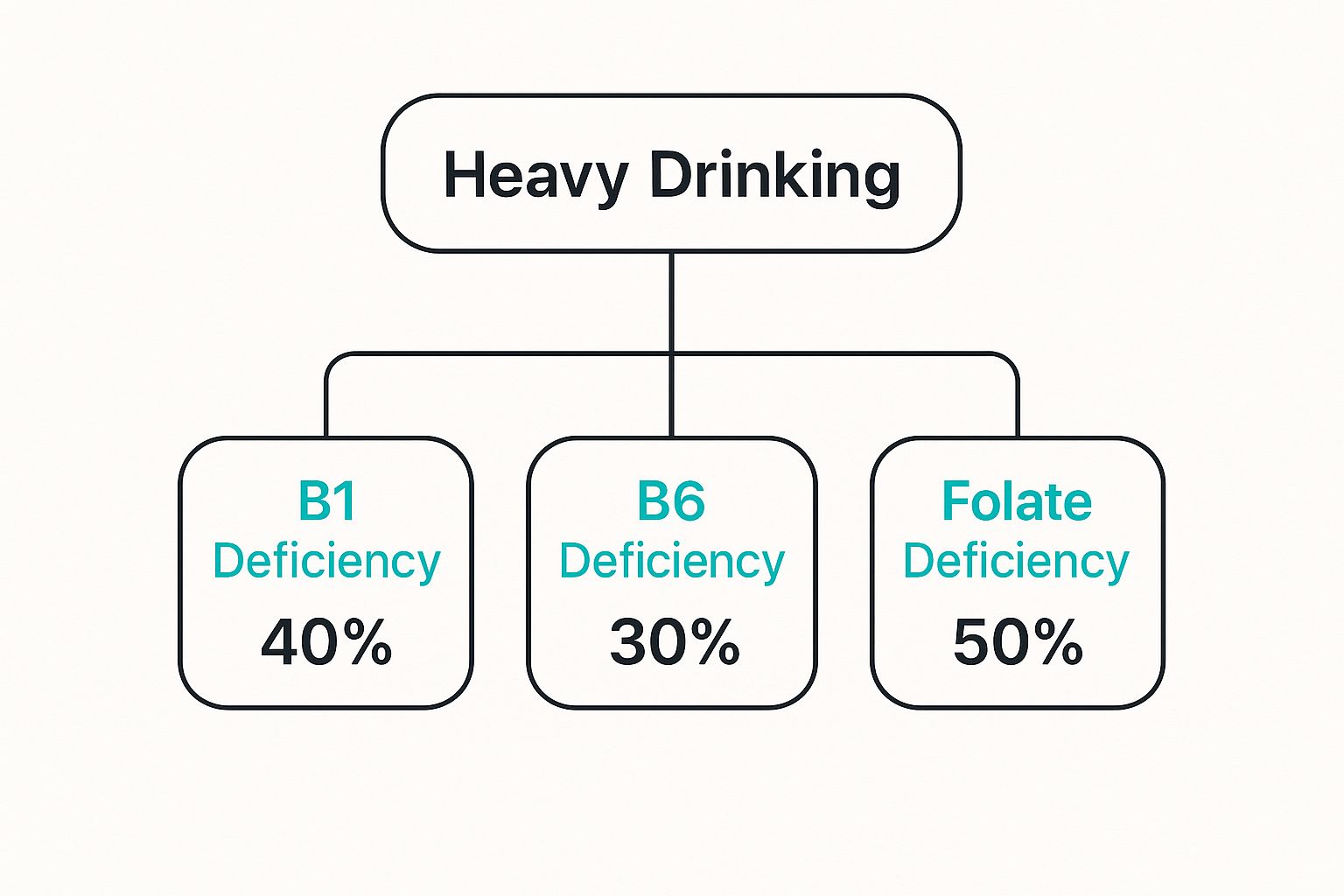
As you can see, deficiencies in Folate (B9) and Thiamine (B1) are especially common, affecting up to half of all heavy drinkers. It’s a stark reminder of the nutritional toll.
Other Key B Vitamins in the Fight
Beyond those big three, several other B vitamins play crucial supporting roles. Each has a specific job, and when one is missing, it can cause a cascade of problems. Let's take a quick look at how alcohol throws them off balance.
How Alcohol Impacts Key B-Vitamins
Alcohol doesn't just deplete one or two B vitamins; it disrupts the entire complex. Here’s a quick summary of how this plays out for some of the most important ones.
| B Vitamin (Name) | Primary Function | Impact of Heavy Drinking |
|---|---|---|
| B1 (Thiamine) | Energy metabolism, nerve function | Blocks absorption, increases excretion. Deficiency can lead to severe neurological damage. |
| B9 (Folate) | Cell growth, DNA formation | Impairs absorption and speeds up breakdown, leading to anemia and fatigue. |
| B12 (Cobalamin) | Nerve health, red blood cell production | Absorption is reduced due to alcohol's effect on the stomach lining. |
| B6 (Pyridoxine) | Neurotransmitter production (serotonin) | Destroyed by acetaldehyde (an alcohol byproduct), which can affect mood. |
| B3 (Niacin) | DNA repair, metabolism | Depleted during alcohol metabolism, diverting it from other critical bodily functions. |
| B2 (Riboflavin) | Energy production, antioxidant function | Alcohol interferes with its absorption, potentially causing skin issues and fatigue. |
Because B vitamins all work together, a shortage in one often signals a problem with the others. This is why a quality B-complex supplement is so often recommended. It’s a foundational step to give your body the tools it needs to repair, recover, and get back on track.
Why Fat-Soluble Vitamins Are Especially Vulnerable
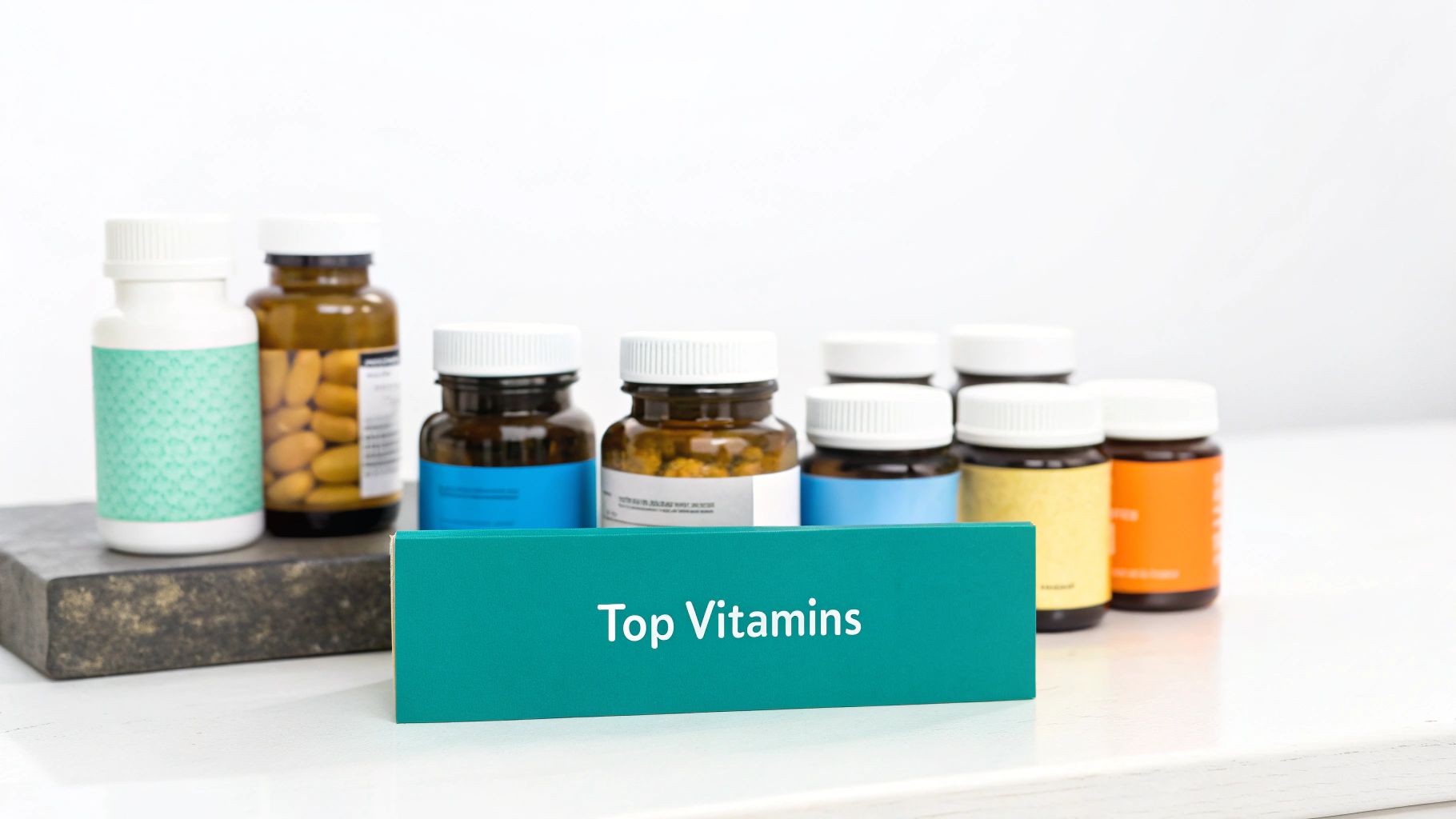
While B vitamins get a lot of attention, another group of nutrients is uniquely in the crosshairs of heavy drinking. These are the fat-soluble vitamins—A, D, E, and K.
Your liver acts as a pantry for these guys. Unlike water-soluble vitamins that your body flushes out pretty quickly, fat-soluble ones are stored in your liver and fat tissues for when you need them. This sounds like a great system, but it creates a serious problem when alcohol enters the picture.
Alcohol directly attacks the liver, compromising its ability to do its job. A key part of that job is producing bile, which is absolutely essential for breaking down fats and, you guessed it, absorbing these specific vitamins from your food. When bile production tanks, so does your ability to restock your vitamin pantry.
The Double Blow to Vitamin A
Vitamin A is a true powerhouse, keeping your vision sharp, your immune system on guard, and your cells growing properly. Alcohol hits your Vitamin A supply with a nasty one-two punch that can spiral into bigger problems.
First, a liver under siege struggles to release its stored Vitamin A into your bloodstream for use. Second, the very enzymes your body needs to activate Vitamin A are the same ones used to metabolize alcohol. Your body is forced to prioritize processing the toxin, leaving this crucial vitamin on the sidelines.
Think of it like this: you have money in the bank, but the roads to the bank are closed and the tellers are busy with an emergency. Even though the Vitamin A is technically there, your body can't access it, leaving your health systems underfunded and vulnerable.
This deficit often shows up as real-world issues, like trouble seeing at night or getting sick more often. For anyone looking for the best vitamins for heavy drinkers, tackling a potential Vitamin A shortage is a non-negotiable part of the recovery plan.
How Alcohol Diminishes Vitamin D and E
Vitamins D and E are two more fat-soluble heroes that take a serious hit from chronic drinking. They each have critical, distinct roles in keeping you healthy, from your bones to your very cells.
- Vitamin D's Downward Spiral: Known as the "sunshine vitamin," Vitamin D is vital for absorbing calcium, keeping bones strong, and even regulating your mood. Your liver is responsible for converting Vitamin D into its usable, active form. Alcohol throws a wrench in this process, making it tough for your body to benefit from this vitamin, no matter how much sun you get.
- Vitamin E as a Cellular Shield: Think of Vitamin E as a bodyguard for your cells. It's a potent antioxidant that protects cell membranes from oxidative stress—basically, cellular rust caused by toxins like alcohol. Heavy drinking burns through your Vitamin E stores as your body desperately tries to neutralize the damage, leaving your cells exposed.
This isn't just a theory; the numbers are pretty stark. Research consistently shows that heavy drinkers are often deficient in these vitamins. For instance, studies have found that a staggering 58% of heavy alcohol consumers have Vitamin D levels below the healthy range. Deficiencies in vitamins A and E are just as common, particularly in people with existing liver damage. You can dig into the science yourself in this in-depth analysis of vitamin deficiencies. #upside #enjoyupside #upsidejelly #livemore #hangovercure #hangoverprevention #fighthangovers #preventhangovers #HangoverRelief #MorningAfter #PartySmarter #HydrationStation #WellnessVibes #RecoverFaster #NoMoreHangovers #HealthyParty #HangoverHacks #FeelGoodMorning #NightlifeEssentials #HangoverFree #SupplementGoals #PostPartyPrep #GoodVibesOnly #HealthAndParty #HangoverHelper #UpsideToPartying
Getting these fat-soluble vitamins back on board is essential for protecting your bones, supporting your immune system, and defending your cells from more harm. Ignoring them leaves a huge gap in your body’s recovery armor.
Essential Minerals and Antioxidants for Cellular Repair
Vitamins are a huge piece of the recovery puzzle, but they don't work alone. To really build a solid defense against alcohol's effects, we need to bring in the unsung heroes of cellular health: essential minerals and powerful antioxidants.
Think of these compounds as your body's dedicated cleanup crew and on-call repair technicians. They work around the clock to fix the mess that heavy drinking leaves behind.
See, heavy drinking basically hits the flush button on your body, washing out vital minerals. At the same time, breaking down all that alcohol creates a firestorm of damaging molecules. Without the right minerals and antioxidants, your body is left trying to patch things up with no tools and a shaky foundation.
The Mineral Drain: Magnesium and Zinc
Two of the first and most important minerals to go when you drink are magnesium and zinc. This isn't a small problem, either. Their absence can trigger a whole cascade of health issues because they're involved in hundreds of critical jobs throughout your body.
Magnesium is a true workhorse, playing a role in over 300 enzyme reactions. It's absolutely essential for keeping your muscles and nerves working properly, managing blood sugar, and even maintaining a steady heartbeat. Because alcohol is a diuretic, it makes you urinate more, flushing magnesium right out of your system and leaving you running on empty.
Imagine magnesium as the steady, calming influence on your nervous system. When your levels are low from drinking, it can directly contribute to that awful feeling of anxiety, shaky hands, and insomnia that often comes with a bad hangover.
Zinc is another major player, critical for a strong immune system, healing wounds, and protecting your liver cells from harm. Just like magnesium, it's easily lost through increased urination from alcohol. A zinc deficiency leaves your immune system weakened—making you more likely to get sick—and gets in the way of your liver’s ability to repair itself.
Combating Cellular Rust with Antioxidants
When your liver metabolizes alcohol, it creates a bunch of highly unstable molecules called free radicals. The best way to picture them is as tiny, destructive sparks flying off a fire, burning anything they land on. This process, known as oxidative stress, is basically a form of cellular rust, causing long-term damage to your cells, proteins, and even your DNA.
This is where antioxidants jump in. They are your body's dedicated firefighters, swooping in to neutralize these free radicals before they can cause chaos. The problem is, chronic drinking completely drains your natural antioxidant reserves because they’re constantly working overtime.
Key Antioxidants for Recovery
Two of the most important antioxidants in this fight are Vitamin C and Selenium. Both are powerful defenders that help shield your body from the inside out.
- Vitamin C: Everyone knows this one, but its power can’t be overstated. It’s a potent antioxidant that zips around your body, neutralizing free radicals. It also helps regenerate other antioxidants like Vitamin E, essentially giving them a second chance to get back in the fight. Alcohol consumption tanks your Vitamin C levels, weakening this crucial line of defense.
- Selenium: This trace mineral is a key building block for a powerhouse antioxidant enzyme called glutathione peroxidase. This enzyme is one of your body’s most effective tools for stopping cellular damage, especially in the liver. Selenium is vital for keeping this protective system armed and ready.
Restocking these key antioxidants is a non-negotiable step in helping your body handle the inflammatory damage from alcohol. A diet packed with fruits and vegetables is a great place to start. If you want to dive deeper into specific foods that can boost your defenses, check out our guide on this antioxidant-rich foods list. #upside #enjoyupside #upsidejelly #livemore #hangovercure #hangoverprevention #fighthangovers #preventhangovers #HangoverRelief #MorningAfter #PartySmarter #HydrationStation #WellnessVibes #RecoverFaster #NoMoreHangovers #HealthyParty #HangoverHacks #FeelGoodMorning #NightlifeEssentials #HangoverFree #SupplementGoals #PostPartyPrep #GoodVibesOnly #HealthAndParty #HangoverHelper #UpsideToPartying
By combining these essential minerals and antioxidants with the right vitamins, you're creating a much smarter and more complete strategy for supporting your body's healing process.
Creating a Practical Nutrient Replenishment Plan
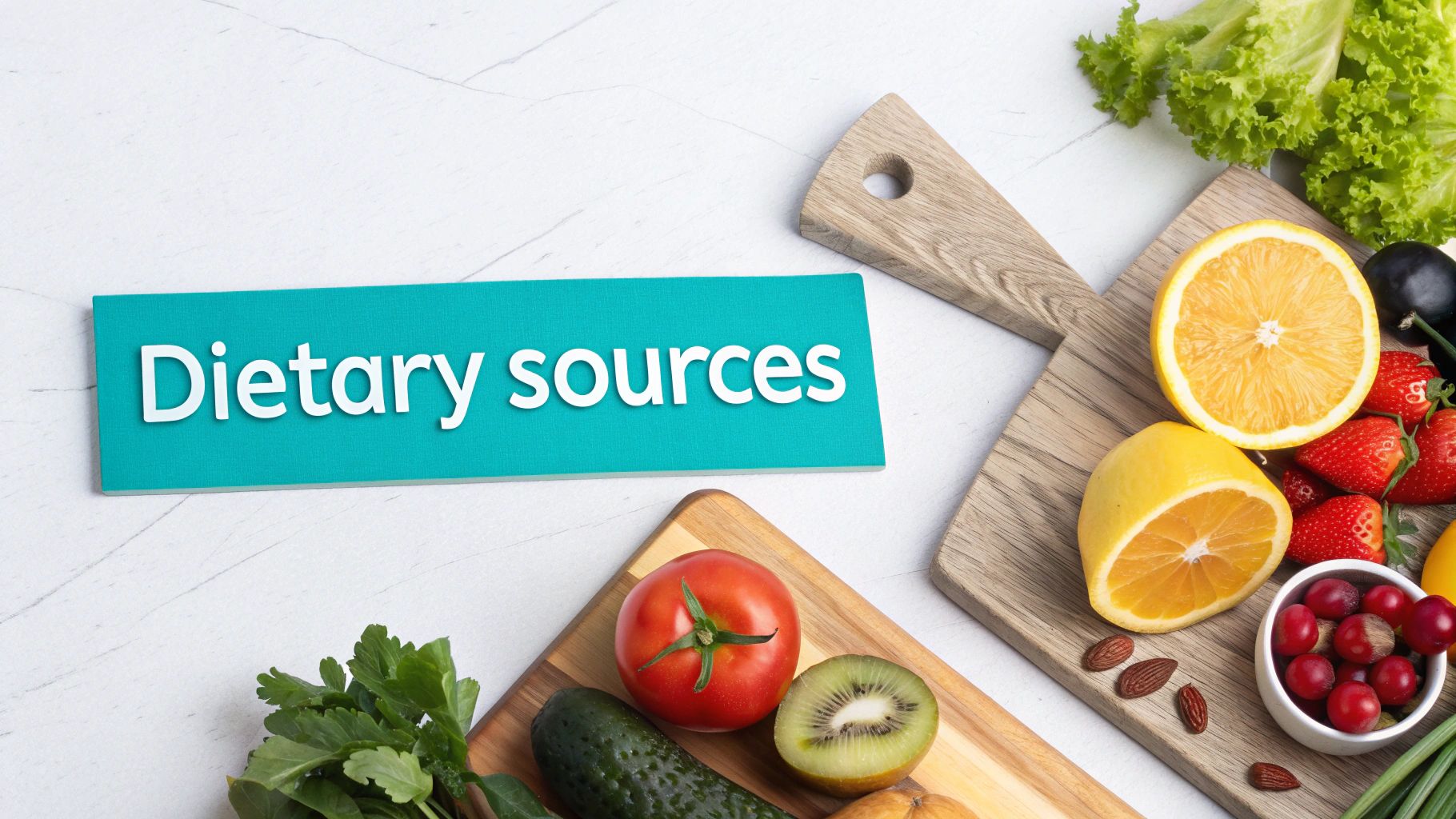
Knowing which nutrients your body is missing is one thing. Actually building a strategy to put them back is the real game-changer. This isn't about chasing perfection overnight. It's about making consistent, smart choices that give your body the raw materials it needs to repair itself.
Think of it like rebuilding a house after a storm. You need a solid two-pronged approach. First, you lay a strong foundation with high-quality bricks and mortar—that’s your food. Then, you bring in the specialized tools to speed things up and reinforce the weak spots—that’s targeted supplementation.
Start with a Food-First Approach
Before you even think about reaching for a supplement bottle, your first line of defense is always your plate. Real, nutrient-dense food provides a whole symphony of vitamins, minerals, and compounds that work together in ways a single pill just can't match. This is how you lay that solid groundwork for recovery.
Your main goal is to load up on meals rich in the specific nutrients that alcohol hits the hardest. That means focusing on whole, unprocessed foods that are easy on a stressed-out digestive system.
Here are the key players you want on your team:
- Leafy Greens: Think spinach, kale, and Swiss chard. They are absolute powerhouses packed with B vitamins (especially folate), magnesium, and antioxidants that directly tackle common deficiencies.
- Lean Proteins: Chicken, fish, tofu, and legumes are crucial for liver repair. They deliver amino acids—the literal building blocks for new cells—and are often great sources of zinc and B vitamins.
- Nuts and Seeds: Almonds, walnuts, and sunflower seeds are your go-to for magnesium, zinc, and Vitamin E. Just a small handful can give you a significant dose of these critical recovery nutrients.
- Whole Grains: Brown rice, quinoa, and oats are loaded with B vitamins, including the incredibly important Thiamine (B1). They provide slow-burning energy and help get your nervous system back on track.
Making these foods a regular part of your routine creates a baseline of support that lets your body start the healing process.
Moving into Smart Supplementation
While a healthy diet is non-negotiable, let's be real: heavy drinking can create a nutritional hole so deep that food alone often isn't enough to fill it quickly. This is where smart supplementation becomes a vital part of your plan. The idea isn't to swallow every vitamin on the shelf, but to strategically plug the most critical gaps.
When you're looking for the best vitamins for heavy drinkers, the key is targeted replenishment. Alcohol's impact isn't random—it systematically drains specific nutrients. Your supplement strategy needs to be just as systematic in putting them back.
A good-quality multivitamin is a decent starting point, since it covers a lot of bases. But because of the severe depletion caused by alcohol, you’ll likely need some targeted backup.
What to Look For in a Supplement
It’s crucial to find supplements in bioavailable forms, meaning your body can actually absorb and use them easily—especially when your digestive system is already compromised.
-
A Potent B-Complex: This is an absolute must. Look for a formula that provides solid doses of all B vitamins, with an extra emphasis on Thiamine (B1) and Folate (B9). These two take the biggest hit and are essential for neurological recovery.
-
Key Minerals: Make sure your plan includes magnesium and zinc. Magnesium glycinate is a great choice because it’s easy on the stomach and has a calming effect, while zinc picolinate is another well-absorbed form.
-
Antioxidant Support: A supplement with Vitamin C and Vitamin E helps fight the massive oxidative stress that alcohol metabolism creates. These vitamins act like bodyguards for your cells, protecting them from further damage.
Enhancing Your Strategy with Complementary Support
Beyond the core vitamins and minerals, other things can amplify your recovery. Proper hydration is at the top of that list. Alcohol is intensely dehydrating, and it flushes out vital electrolytes right along with all that water.
This is where a product like Upside Hangover Sticks can be a perfect wingman for your nutritional strategy. It’s not a replacement for those essential vitamins, but its targeted blend of electrolytes and plant extracts is designed to tackle the immediate aftermath of drinking.
Upside helps by:
- Boosting Hydration: Replenishing lost electrolytes like sodium and potassium is key to restoring fluid balance and kicking symptoms like headaches and fatigue to the curb.
- Supporting Recovery: Ingredients inspired by traditional remedies can help your body process alcohol byproducts more efficiently, easing the burden on your system.
When you combine a nutrient-dense diet, targeted supplementation with the best vitamins for heavy drinkers, and complementary support like Upside for hydration, you create a powerful, multi-faceted plan. You're giving yourself tangible steps to start replenishing your body and taking back control of your health.
The Hidden Dangers of Alcohol-Related Malnutrition
It’s easy to focus on the more obvious consequences of heavy drinking, but one of the most serious dangers is almost completely invisible. We're not talking about weight gain. We're talking about something deeper and far more critical: alcohol-related malnutrition.
This is a profound internal deficit. It’s when your body is literally starved of the vitamins and minerals it desperately needs to function—let alone repair the damage alcohol causes.
And this isn't some rare side effect; it's a full-blown health crisis hiding in plain sight. Hospital data shows just how common this is, with shocking statistics revealing that more than 50% of patients admitted for substance use treatment are running on empty, deficient in key vitamins, minerals, or electrolytes. You can get a closer look at the findings on alcohol and nutritional deficiency and see just how widespread this problem is. #upside #enjoyupside #upsidejelly #livemore #hangovercure #hangoverprevention #fighthangovers #preventhangovers #HangoverRelief #MorningAfter #PartySmarter #HydrationStation #WellnessVibes #RecoverFaster #NoMoreHangovers #HealthyParty #HangoverHacks #FeelGoodMorning #NightlifeEssentials #HangoverFree #SupplementGoals #PostPartyPrep #GoodVibesOnly #HealthAndParty #HangoverHelper #UpsideToPartying
A Cascade of Long-Term Health Risks
When your body is constantly short on these essential nutrients, it sets the stage for some serious long-term health problems. The vitamins and minerals we've been talking about aren't just "nice-to-haves." They're the absolute foundation of your health. When they go missing, the whole structure starts to wobble.
Prioritizing nutritional health isn't just a part of recovery; it is the cornerstone. Rebuilding your body from the inside out gives you the physical and mental foundation needed to sustain long-term well-being.
Without a steady supply of these building blocks, your body simply can't keep up with the repairs needed to counteract alcohol's damaging effects. It's a dangerous cycle: the damage keeps getting worse while the body's ability to heal itself slows to a crawl. This is what leads to a host of serious conditions down the road.
From Brain Fog to Chronic Disease
The long-term fallout from these deficiencies can be severe, impacting literally every system in your body. Making a conscious effort to replenish these nutrients is the key to turning things around.
- Neurological Damage: A serious shortage of Thiamine (B1) can lead to irreversible brain damage, messing with your memory and coordination. Gaps in other B vitamins can also bring on nerve pain and mood disorders.
- Liver Disease: Without antioxidants like Vitamin E and minerals like zinc, your liver is left wide open to oxidative stress. This paves the way for chronic inflammation and, eventually, serious liver conditions.
- Weakened Immunity: Running low on Vitamins A, C, and zinc is like disarming your body's security system. It leaves you way more vulnerable to getting sick from every little thing going around.
- Bone Health Decline: When Vitamin D levels drop, your body can't absorb calcium properly. Over time, this can lead to weaker bones and a much higher risk of fractures.
This really drives home a crucial truth: you can't ignore your nutritional health if you're serious about recovery. If you are a heavy drinker, the single most important step you can take is to talk to a healthcare professional. They can give you personalized advice and help you map out a safe, effective plan to restock what’s been lost and start building a healthier future.
Got Questions? We’ve Got Answers.
When you start digging into the connection between alcohol and vitamins, a lot of questions pop up. Let's tackle some of the most common ones you might be thinking about.
Can’t I Just Get Everything I Need From My Diet?
In a perfect world, yes. But here's the reality: heavy drinking throws a serious wrench in your body's machinery. It directly damages your gut's ability to pull nutrients out of the food you eat, which makes getting what you need from diet alone incredibly difficult.
This is especially true for B-vitamins like thiamine. That’s why many health professionals will recommend supplements as a reliable way to fill that gap, making them a crucial part of the strategy for finding the best vitamins for heavy drinkers.
How Long Until I’m Back to Normal?
That's the million-dollar question, and the honest answer is: it depends. The timeline is different for everyone, based on how severe the deficiency is and your overall health. The good news? With a break from alcohol and the right supplements, you can start feeling improvements in just a few weeks.
But fully rebuilding your nutrient stores and letting your body heal can take several months, sometimes longer. The absolute key here is consistency. Sticking with it is what creates real, lasting change.
A quick but important heads-up: Always talk to your doctor before starting any new, high-dose vitamin routine, especially if you're still drinking. While these nutrients are vital, too much of a good thing can be bad. Overdoing certain vitamins, like Vitamin A, can actually be toxic to an already-stressed liver. A doctor can give you advice on safe amounts that are right for you.
For a smart way to support hydration and recovery after a night out, trust Upside to help you bounce back. Our Hangover Sticks are designed to replenish what you've lost so you can feel your best the next day. Explore our solution at https://enjoyupside.com. #upside #enjoyupside #upsidejelly #livemore #hangovercure #hangoverprevention #fighthangovers #preventhangovers #HangoverRelief #MorningAfter #PartySmarter #HydrationStation #WellnessVibes #RecoverFaster #NoMoreHangovers #HealthyParty #HangoverHacks #FeelGoodMorning #NightlifeEssentials #HangoverFree #SupplementGoals #PostPartyPrep #GoodVibesOnly #HealthAndParty #HangoverHelper #UpsideToPartying
